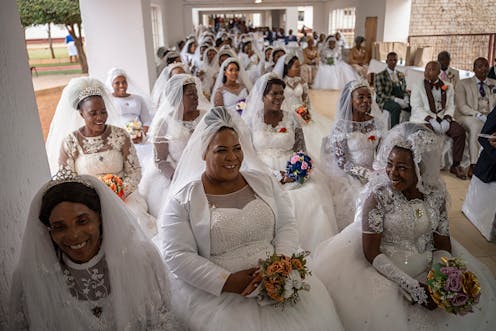
South Africa is changing its marriage law to recognise all types of intimate partnerships – irrespective of gender, sexual orientation, or religious, cultural and other beliefs.
The Department of Home Affairs has invited public comment on the Draft Marriage Bill 2022. The bill amends some marriage laws, and prescribes what’s required for marriages to be considered valid, forms of registration, and the property consequences of marriage. As the preamble shows, it seeks to promote liberal values of equality, nondiscrimination, human dignity and freedom of thought.
While it is innovative for bringing all forms of intimate partnerships under one piece of legislation, the bill raises thorny questions. Liberalism – or openness to different behaviour, opinions or new ideas – is a strange beast. It pushes accepted conduct to its limits.
For instance, if the bill truly seeks equity, why does it not recognise intimate partnerships such as cohabitation? Why does section 22(6) criminalise marriage between people who are related to each other by adoption or by blood (to certain degrees)?
I have researched these issues, notably as a member of the Advisory Committee on Matrimonial Property of the South African Law Reform Commission.
Read more: Understanding the relevance of African customary law in modern times
I believe that even though the bill promotes important constitutional values, it does not sufficiently reflect changing social and economic conditions. Specifically, it ignores polyandry – marriage of a woman to more than one man – and unmarried partnerships. This is significant because other laws recognise civil unions, which include formalised marriage-like partnerships of same-sex couples.
The thorny issues
Firstly, radical socioeconomic changes require society to reevaluate traditional assumptions about accepted forms of relationships. Due to urbanisation and the interaction of different cultures, relationships such as cohabitation and polyandry are rising. A couple could live together for reasons such as exorbitant rent, distance to workplaces, and prohibitively high bridewealth (ilobolo).
The bill doesn’t recognise such intimate partnerships, which the Constitutional Court has accorded the same legal status as formal marriages. As the court has acknowledged, unmarried partnerships have serious implications for finances, human dignity, property ownership and child custody.
Secondly, the Marriage Bill defines ilobolo as
property in cash or in kind … which a prospective husband or the head of his family undertakes to give to the head of the prospective wife’s family in consideration of a customary marriage.
This implies that only (traditionally male) family heads can receive it. The definition does not anticipate a role for women, as happens among the Galole Orma people of northeastern Kenya.
Also, the position of family head could be disputed where the mother is divorced and raised the bride alone. As far back as 1997, the Transvaal High Court ruled that the bride’s mother could negotiate and receive ilobolo. The bill should therefore redefine bridewealth as “money, property, or anything of value given by the groom or his family to the bride’s family in consideration of marriage and/or to symbolise a union between the groom and bride’s families”.
This definition is consistent with the decreasing role of the extended family in the education or raising of the bride. Uncles and aunts should not benefit from bridewealth if they did not assist in raising the bride.
Thirdly, the bill is silent on the coexistence of a civil law marriage with a customary or religious marriage. For reasons like legal certainty and communal respect, double marriage is common. Previously, if a couple in a civil marriage subsequently concluded a customary or religious marriage, the state regarded the latter marriage as invalid.
The bill creates ambiguity because it does not stipulate the fate of a subsequent customary or religious marriage. This could affect inheritance, property and child custody because legal systems may govern these issues differently.
Read more: South Africa's courts and lawmakers have failed the ideal of cultural diversity
Furthermore, the bill defines polygamous marriage as “a marriage in which a male spouse has more than one spouse at the same time”. This patriarchal definition does not promote equality. It implies that a woman should not marry more than one man.
Finally, the bill imposes an omnibus standard for divorce on all marriages. This standard may complicate divorce under Islamic and customary law, where the standard is relaxed. Also, section 21(1) of the bill states that a marriage may be dissolved by the “continuous unconsciousness of one of the spouses,” without specifying how long a spouse must be unconscious following an injury, for example.
If the thorny issues in the bill are not addressed, the eventual legislation could be challenged as discriminatory. Its amendment would then drain the public purse.
A balancing act
Significantly, the bill emerged from the 2022 White Paper on marriages and life partnerships. The advisory committee that worked on the Single Marriage Statute (Project 144) proposed two options for regulating life partnerships in its discussion paper.
These are a Protected Relationships Bill and a Recognition and Registration of Marriages and Life Partnerships Bill. It appears Home Affairs did not add life partnerships to the bill because it is controversial. But legislative avoidance is unhelpful because it postpones inevitable problems. The Constitutional Court recognises the right of a woman in a life partnership to inherit or claim maintenance from her deceased partner’s estate.
Read more: LGBTQ+ rights: African Union watchdog goes back on its own word
Ultimately, new forms of relationships demand legislative recognition. Law reform should be carefully handled to ensure that non-discriminatory cultural and religious practices are respected. The bill should strike a balance between preserving these practices, promoting liberal values, and recognising the evolving realities of contemporary relationships.
Anthony Diala receives funding from the National Research Foundation of South Africa (Grant Number 136532).
This article was originally published on The Conversation. Read the original article.







